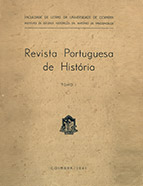

................................
Composed and printed at Tipografia da Atlântida, the first tome of the Revista Portuguesa de História [Portuguese Journal of History] was published in 1941 and sponsored by the Instituto de Alta Cultura [Institute of High Culture]. The cover was sober. At the top, it bore the name of the institution that gave birth to it—the Faculdade de Letras da Universidade de Coimbra [Faculty of Arts and Humanities of the University of Coimbra]—and of the Institute to which it would be linked until 1975: the Instituto de Estudos Históricos Dr. António de Vasconcelos [Dr. António de Vasconcelos Institute of Historical Studies]. In the middle of the page, below the name of the journal, one can see the mark of the Instituto de Estudos Históricos [Institute of Historical Studies] , a stamp adapted from the woodcut created by António Augusto Gonçalves (1848-1932) for the ex-libris of António de Vasconcelos. The drawing depicts a monk in a writing posture, illuminated by a lamp, with the motto below: Interroga et diligenter investiga .
In the words of António de Oliveira, the 4th Group (History) of the Faculty of Arts and Humanities was experiencing a time "of great historiographical vigour", as can be seen from the areas of specialisation and the work of the members of the RPH editorial board: Damião Peres (History of the Discoveries), Joaquim de Carvalho (History of Culture and Philosophy), Virgílio Correia (Archaeology), Manuel Lopes de Almeida (Social History and Institutions), Paulo Merêa and Luiz Cabral de Moncada (History of Law and Institutions), Mário Brandão and Torquato Sousa Soares (History of Institutions).
The rationale for the creation of the RPH, along with its goals and guiding principles, was clearly articulated in the editorial: "The increasingly pressing need for a Portuguese history journal prompted the Board of the Institute of Historical Studies to initiate the publication of a yearbook that would serve both as a living testament to its cultural activity and as a means of projecting that activity across the country. Thus, while it exists essentially to archive the production of the group of scholars who work at the Institute, it does not reject the contribution of outsiders who want to work in harmony with its methods of historical research and criticism. And because historical work is, by its nature, a collaborative work, the Revista Portuguesa de História will also strive to establish connections with various countries in Europe and America, showcasing, through their most representative figures, the outcomes of their scientific activity—outcomes that can provide new directions for the national historiography that our journal aims, above all, to promote and serve."
This work is financed by national funds through FCT - Foundation for Science and Technology, I.P, in the scope of the projects UIDB/04311/2020 and UIDP/04311/2020.
